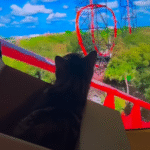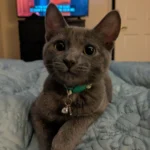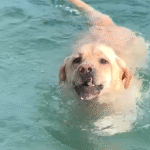Have you ever felt the warm glow of a budding connection with your cat, only to watch them suddenly slink away just as things seemed to be going well? This mystifying moment can leave cat lovers puzzled, even a little heartbroken. It’s tempting to take it personally—did you make a wrong move, or is your cat sending mixed signals on purpose? The truth is, feline behavior is a rich tapestry of instincts, emotions, and past experiences. Understanding why some cats retreat just before bonding not only deepens your relationship but also uncovers the delicate, surprising world that shapes how cats love and trust. Let’s unravel the secret reasons behind this intriguing behavior and bring you closer to your feline companion.
The Complex Nature of Feline Trust

Trust for cats is not a simple, binary state. Unlike dogs, who may quickly warm up to new people, cats often approach trust in cautious, gradual steps. Their wild ancestors relied heavily on vigilance for survival, and this trait still lingers in our house cats today. Even when a cat begins to bond, the leap from curiosity to true trust can be daunting. This hesitation is not a sign of rejection but a sign that your cat is carefully weighing its safety. Many cats will test the waters, enjoying affection one moment and pulling back the next. This dance of approach and retreat is part of building a genuine, lasting relationship with your cat. If your feline friend backs off, it may simply mean they need more time to process their feelings and environment.
Past Experiences and Early Socialization

A cat’s history plays a huge role in how they approach bonding. Cats that were well-socialized as kittens, exposed to gentle human handling, are often more confident and quicker to trust. In contrast, those who had limited or negative experiences with people may be more likely to retreat, especially when intimacy grows. Trauma or rough handling in the past can cause a cat to associate closeness with discomfort or fear. Even subtle factors, like being weaned too early or not being exposed to a variety of people, can make bonding more challenging. This doesn’t mean the bond can’t be built; it just means extra patience and understanding are required. Think of it as helping a friend learn to trust again after a bad experience.
Sensitivity to Sudden Changes

Cats are creatures of habit, thriving on predictability and routine. Sudden changes in their environment or in your behavior can throw them off balance, making them retreat just as you’re making progress. A loud noise, unexpected guest, or even a new scent on your clothes can disrupt their sense of security. Cats are incredibly sensitive to their surroundings, and even small shifts can seem overwhelming when they’re on the verge of bonding. If your cat backs away, take a look at what might have changed in their world. Restoring a sense of normalcy and calm can help them feel safe enough to try connecting again.
Fear of Vulnerability and Loss of Control

Bonding requires vulnerability, and for many cats, this can feel risky. When a cat allows you to get close, they’re giving up a degree of control—something they instinctively guard. The closer you get, the more exposed they may feel, triggering a retreat as a protective measure. This behavior is especially common in cats that have lived outdoors or have had to fend for themselves. They’ve learned to keep one eye open, even in moments of affection. Allowing your cat to initiate closeness and respecting their boundaries helps them feel more in control, making them less likely to pull away.
Personal Space and Independence

Cats are famously independent, and this trait often shows up just when you think you’re forming a close bond. For many cats, maintaining personal space is as important as sharing affection. They might crave your company one moment, then need to recharge alone the next. This ebb and flow is entirely normal and doesn’t mean your cat is confused or rejecting you. Instead, it’s a sign that they value both connection and autonomy. Giving your cat the freedom to come and go as they please can actually strengthen your bond over time, as they learn that being with you is always their choice.
Overstimulation and Sensory Overload

Cats can become easily overstimulated, especially during petting or play. What starts as enjoyable contact can quickly become too much, causing a cat to retreat suddenly. Signs of overstimulation include twitching tails, flattened ears, and rapid grooming. Each cat’s threshold for touch is different—some love long cuddle sessions, while others prefer brief interactions. Learning your cat’s signals and respecting their limits is key. Think of it like enjoying a massage: sometimes a gentle touch feels wonderful, but too much pressure or duration can become uncomfortable. By paying attention to when your cat needs a break, you can help them feel safe to return for more affection later.
Misinterpretation of Human Signals

Humans and cats communicate very differently, and sometimes our well-meaning gestures can send the wrong message. Prolonged eye contact, direct reaching, or loud voices can be perceived as threatening by a cat, even if you’re trying to show love. Cats rely on subtle cues—like slow blinking or gentle head tilts—to signal friendliness. If your cat retreats just as you’re trying to bond, consider how your actions might be interpreted from their perspective. Adapting your approach to be softer and quieter can put your cat at ease, encouraging them to stay close rather than flee.
Building Trust Through Patience and Consistency

The journey to a strong bond with your cat is often paved with patience and gentle persistence. Rushing the process or trying to force closeness can backfire, making your cat even more wary. Instead, focus on creating a consistent, predictable environment where your cat feels safe to explore connection at their own pace. Small gestures, like offering treats, gentle play, or simply sitting nearby without demanding attention, can build trust over time. Celebrate the small victories—like a head bump or a purr—even if they’re followed by a quick retreat. Over time, your consistent care will speak louder than any words or gestures.

Growing up traveling and experiencing new cultures and wonders, I have had a passion for nature, adventuring, photography, and videography. I am currently working towards a BSc in Biodiversity and Ecology at Stellenbosch University, and I hope to specialise in Marine Sciences one day.
Please send any feedback to Feedback@animalsaroundtheglobe.com






